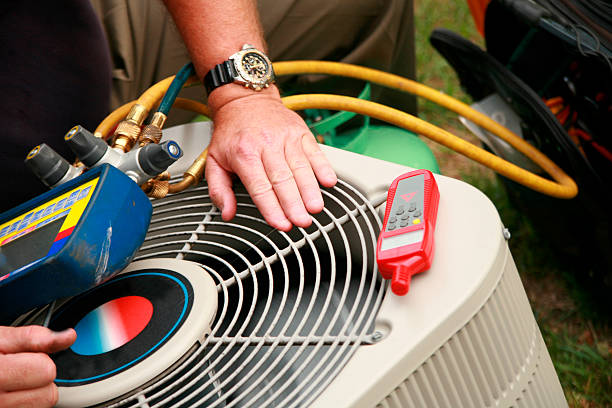Local hvac team you can rely on.
Just How to Improve Energy Performance With Your Heating And Cooling System and Heating System Upgrades
As power costs proceed to increase, the significance of enhancing power efficiency via HVAC system and heater upgrades can not be overstated. Evaluating your existing system's performance and taking into consideration energy-efficient choices are necessary first steps.
Assess Your Present System
Before getting started on any type of upgrades, it is important to evaluate your existing cooling and heating system and furnace to understand their efficiency and efficiency. This first assessment gives a structure for identifying areas that need improvement and informs choices regarding prospective upgrades. Begin by checking out the age of your cooling and heating system, as obsolete models might do not have contemporary energy-saving functions.

Energy usage documents will likewise contribute in gauging your system's operational expenses. By assessing utility costs, you can establish patterns of energy use and identify spikes that require additional investigation. Consider performing a specialist power audit to obtain an expert evaluation of your system's efficiency. This detailed assessment will certainly assist you in making notified selections around needed upgrades, making sure that your investments in energy performance yield the preferred advantages.
Upgrade to Energy-Efficient Models
Upgrading to energy-efficient designs is a crucial step in improving the general efficiency of your heating and cooling system and heater. These modern units are developed to eat much less energy while providing optimum heating and air conditioning, resulting in considerable price savings on energy expenses and a reduced ecological footprint.
When thinking about an upgrade, look for versions that have high Seasonal Energy Performance Ratios (SEER) for a/c and Yearly Gas Utilization Effectiveness (AFUE) scores for heaters. These ratings show the efficiency of the systems, with greater numbers showing far better efficiency. Energy-efficient versions frequently integrate sophisticated modern technologies, such as variable-speed motors and clever thermostats, which further improve energy cost savings.
Furthermore, several energy-efficient a/c systems are outfitted with improved insulation and far better securing, which lessen power loss and boost interior convenience. furnace repair. While the first investment might be greater, the long-lasting financial savings on energy expenses and prospective tax obligation motivations for making use of energy-efficient appliances can counter this expense substantially

Ultimately, upgrading to energy-efficient models not only contributes check my blog to an extra lasting future yet also boosts the comfort and performance of your home or organization.
Optimize System Setups
To take full advantage of the performance of your Heating and cooling system and heater, it is necessary to optimize system settings tailored to your certain demands. Start by establishing your thermostat to an energy-efficient temperature level.
Utilize programmable or wise thermostats that enable you to schedule temperature level modifications instantly. This ensures your system runs just when needed, reducing energy consumption. Furthermore, make sure that your system is established to run in the correct mode-- heating in winter months and air conditioning in summer-- while staying clear of the constant follower option unless required for air flow.
Regularly review and adjust settings based on seasonal modifications, occupancy patterns, and particular comfort preferences. Additionally, make certain that vents and signs up are unobstructed, enabling optimum air read this flow. Consider zoning systems that make it possible for customized comfort in different areas of your home, additionally boosting performance. By fine-tuning these settings, you can achieve significant energy financial savings while preserving a comfy living setting.
Improve Insulation and Sealing
A well-insulated home is essential to optimizing the efficiency of your A/c system and furnace. Correct insulation lowers the work on these systems, thus conserving power and lowering energy expenses.
Along with insulation, securing spaces and cracks is essential. Pay special attention to home windows, doors, and any kind of infiltrations in walls, such as electric outlets and plumbing fixtures. Weatherstripping and caulking can effectively secure these openings, preventing drafts that endanger your a/c performance.
Additionally, make sure that ducts are properly protected and secured. Leaking air ducts can bring about considerable energy losses, decreasing system efficiency. Making use of mastic sealer or metal tape to seal duct joints can boost airflow and performance.
Arrange Normal Upkeep
Routine upkeep of your HVAC system and heater is essential for ensuring optimum performance and long life. During maintenance, a qualified technician will clean and change filters, check cooling agent levels, check ductwork for leakages, and assess total system operation.
It is suggested to arrange you can try this out maintenance at the very least twice a year-- as soon as in the spring for the cooling system and when in the loss for the heater. air conditioner repair. Regular maintenance aids preserve consistent interior temperature levels, making certain comfort throughout the year. Furthermore, a well-kept system runs more effectively, which can lead to noticeable reductions in energy bills
Overlooking maintenance can lead to decreased performance, raised deterioration, and eventually, system failing. By focusing on regular solution, homeowners can avoid unforeseen breakdowns and ensure their HVAC system and heating system operate at peak efficiency. Buying maintenance is an important action in enhancing energy performance and creating a much more sustainable home setting.
Conclusion
Finally, enhancing energy efficiency within cooling and heating systems and heater upgrades is vital for minimizing energy consumption and boosting total convenience. A systematic strategy that includes assessing the present system, investing in energy-efficient designs, maximizing settings, boosting insulation, and scheduling routine upkeep can lead to significant benefits. Executing these approaches not just decreases energy costs yet additionally contributes to a much more lasting environment, making it vital for house owners to focus on these upgrades.